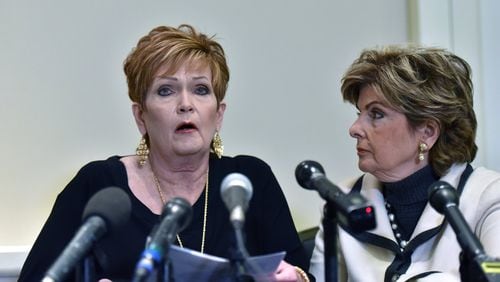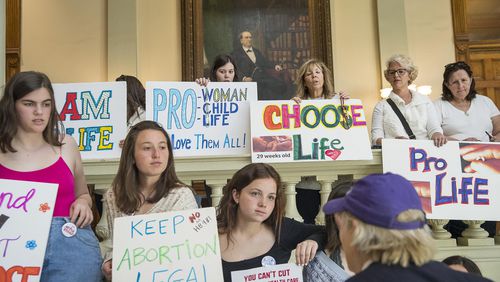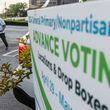Sonny Martin was asked what it would mean to Alabama Republicans like him if Roy Moore lost Tuesday’s special election for the U.S. Senate. He barely hesitated.
“It would be devastating,” said the pawnshop manager in downtown Heflin. “If Republicans can’t win this race, then they have some real big things to worry about.”
When Alabama voters head to the polls Tuesday to decide between Moore and Democrat Doug Jones, they’ll be facing a gut-check decision that’s being scrutinized across the nation.
No Democrat has won election to the U.S. Senate in Alabama in a quarter-century, but allegations that Moore pursued sexual relationships with teenage girls when he was in his 30s have rocked the race. Moore has denied them and cast them as attempts by outside forces to sway the race.
Georgia and Alabama are vastly different states, but the broader political strategies at play in Tuesday’s race are similar.
Democrats in both states hope to flip independent voters in affluent suburbs who generally lean toward the GOP while energizing their core voters. And Republicans aim to maximize their advantage in rural areas that have become nearly impregnable bastions of GOP support.
That's the dynamic in Heflin's Cleburne County, which has steadily turned deeper shades of red. George W. Bush carried it with 65 percent of the vote in 2000 and John McCain won 80 percent in 2008. Mitt Romney took it with 83 percent in 2012. And Donald Trump? He won nearly 90 percent last year.
Interviews with residents across this county of 15,000 on the Alabama-Georgia line showed the depth of the struggle that Jones and other Democrats face in cutting into Republican margins in rural areas.
Many held a deep skepticism about the reports of sexual misconduct and held Moore in the same high regard as Trump: Both were seen as crusaders against elite status quo forces bent on doing everything to prevent them from taking power.
“Democrats and Republicans — those feathers come off the same bird,” said Kyle Thrower, a 51-year-old retiree. “Jones has no chance here. And we all know if those allegations were true, then why are they just coming out now?”
‘Tear him down’
There’s no guarantee that rural voters will continue to flock to Moore with the same sort of enthusiasm. And Moore’s margins in previous statewide votes show he has underperformed other Republicans.
In 2012, he narrowly won a vote for state Supreme Court chief justice even as Mitt Romney carried the state by 22 percentage points. And in his 9-point victory over Luther Strange in the GOP Senate primary, Moore lagged in the affluent, conservative suburbs as well as some rural areas.
That was before The Washington Post's report uncovering a series of allegations against Moore of sexual misconduct directed toward teenagers while serving as a prosecutor in Etowah County, Ala., from 1977 to 1982. Veteran Alabama strategists expect that to take a toll on some of Moore's support among evangelical voters.
“He’ll lag his usual vote share even in rural areas,” said Zac McCrary, a political strategist based in Montgomery. “There will be many Republicans who just don’t want Roy Moore as the face of Alabama, don’t want Roy Moore embarrassing Alabama further, and think he will make the problems in Washington worse.”
Moore has denied the allegations and claimed he’s up against a coordinated response from media outlets and Washington forces trying to derail his campaign. And that us-against-them line of attack has gained traction with some of his core supporters.
“I think Democrats are making stuff up. I just don’t put anything past them anymore,” said Gary Wright, a Heflin pharmacist.
“We finally have a nonpolitician who will work,” he said, invoking Trump, “and this is what they do to try to tear him down.”
What’s at stake
A Democratic win in the Tuesday vote would narrow the Republican’s already-tenuous four-vote majority in the U.S. Senate. That would mean just one GOP defection on a party-line vote could imperil a Senate measure, complicating Republican hopes for a major health care overhaul or an immigration crackdown.
But some Republicans fear a victory by Moore, who was twice removed from the Alabama Supreme Court, will be just as damaging.
The party will be forced to debate whether to seat an accused sexual predator. And Moore seems destined to continue his running war with Senate Majority Leader Mitch McConnell and other figures in a GOP caucus that depends on collegiality and consensus.
Democrats, meanwhile, are already seeking to tie Moore to Republican candidates seeking higher office in next year’s midterm elections.
Stacey Evans, a Democratic candidate for Georgia governor, challenged her GOP rivals to disavow Moore's candidacy.
That brought sharp rebukes from several candidates, including Georgia Secretary of State Brian Kemp. He said people who use their positions of power to take advantage of others should be “tried, sentenced and punished to the fullest extent of the law.”
But he added he had little say in the affairs next door: “In Alabama, voters — not I — have an important decision to make at the ballot box next week. If Stacey Evans is so concerned about elections in other states, maybe she should run for president, too.”
Hints of an Ossoff effect?
Jones, meanwhile, faces his own stiff headwinds in a state that hasn’t elected a Democrat to a major statewide post since 2006.
He needs Alabama’s black population — a predominantly Democratic voting bloc that accounts for about 27 percent of the state’s electorate — to turn out in droves.
That’s why he’s depended on U.S. Rep. John Lewis of Atlanta and other prominent Democrats to help energize voters in Birmingham and a ribbon of majority-black counties stretching across the bottom-third of the state.
But he also needs voters in Republican-leaning suburbs on the outskirts of Birmingham, Huntsville and Mobile to vote across party lines — or not cast a ballot at all.
Some suburban voters who have never cast Democratic ballots say they've proudly posted Jones signs in their yards, though others say they can't stomach voting for a Democrat under any circumstance.
That has some analysts comparing the race to the June special election runoff in Georgia's 6th Congressional District, when Republican Karen Handel won the race to represent Atlanta's conservative-leaning northern suburbs despite an unprecedented infusion of cash and attention to support Democrat Jon Ossoff.
“In an unusually-timed special election where one side may have an enthusiasm advantage, Jones might be able to win,” wrote Geoffrey Skelley of the University of Virginia’s Center for Politics.
“Still, this may end up being a result similar to the special election in Georgia … where Democrats got their hopes up for a victory but the Republicans held on for a close win.”
In Heflin, Martin echoed other Republicans in questioning the allegations against Moore — “What happened to innocent until proven guilty?” he asked — before saying unequivocally he could not vote for a Democrat in a federal election.
“I vote for the person, but there are things I just won’t support. Abortion is one of them, and the Democrats fight for that,” he said, adding: “It’s going to be a close race. But I think Roy will pull it off. If he can’t win, then Republicans have things to worry about.”
About the Author







